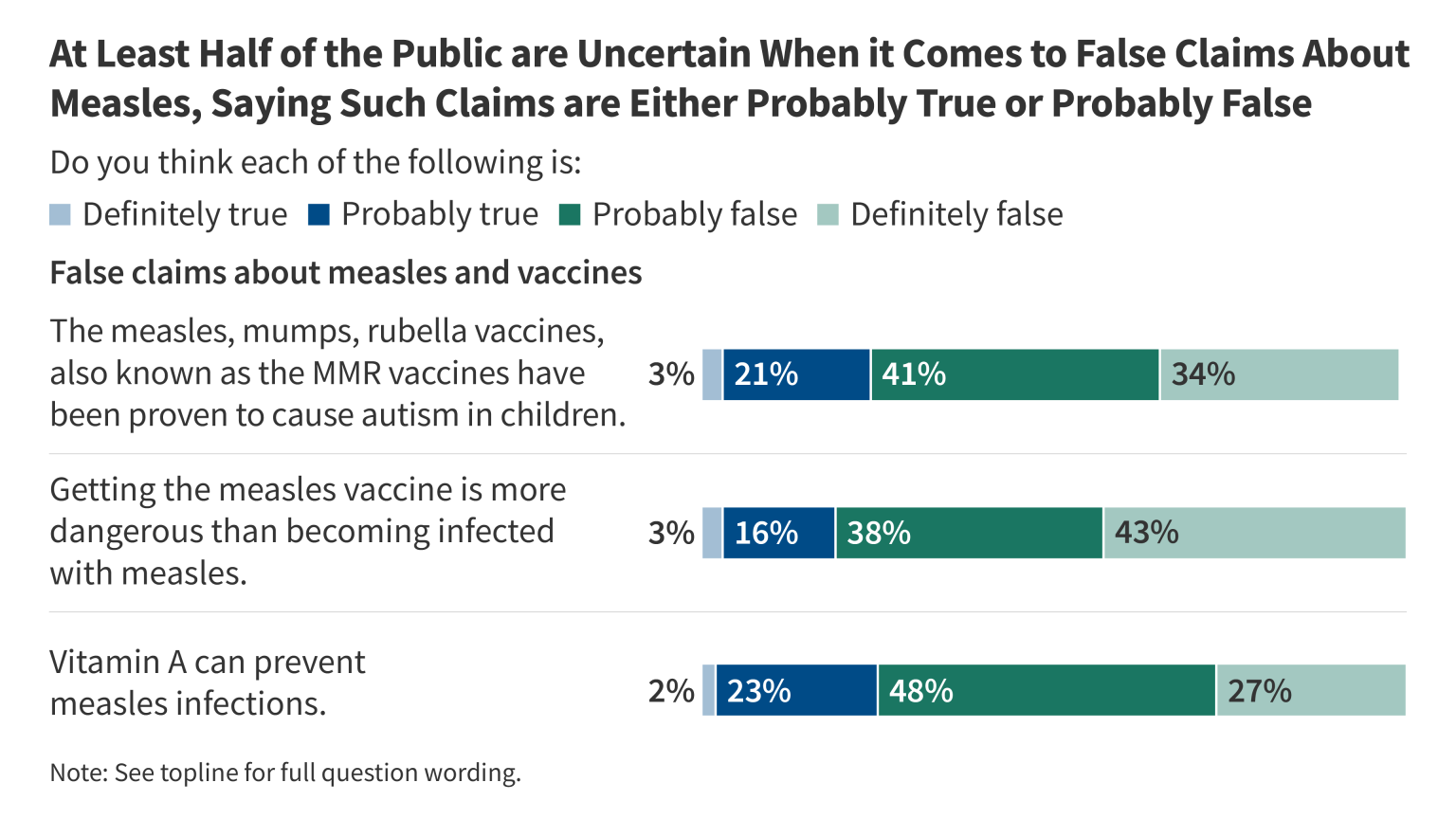Listen to the article
Measles Outbreaks Spark Concern Amid Rising Cases and Partisan Divide on Vaccine Safety
Measles cases in the United States have surged to their highest level since 2019, with more than 800 confirmed cases across over 20 states as of late April—already double the number reported in 2024. A new KFF Tracking Poll on Health Information and Trust reveals about half of American adults (51%) and parents (47%) express concern about the current measles outbreak, with approximately one in seven adults saying they are “very worried.”
The poll uncovers significant demographic and partisan differences in both awareness and concern about the outbreak. About six in ten Black and Hispanic adults express worry about measles, compared to 46% of White adults. Most adults (56%) and nearly half of parents (48%) are aware that measles cases have increased compared to recent years, though a substantial portion remain uninformed or uncertain about the trend.
“The partisan divide on this public health issue is striking,” said a health policy expert familiar with the findings. “Democrats are more than twice as likely as Republicans to express concern about measles outbreaks, and they’re significantly more informed about the rising case numbers.”
Indeed, 76% of Democrats report being worried about the outbreak compared to just 28% of Republicans. Similarly, 71% of Democrats are aware that measles cases have increased, versus 49% of Republicans. This partisan gap extends to parents as well, with Democratic-leaning parents nearly three times more likely than Republican-leaning parents to express concern (73% versus 26%).
Health misinformation appears to be widespread, with the false claim linking MMR vaccines to autism being the most pervasive. About six in ten adults (63%) and parents (61%) report having heard this debunked assertion. The proportion of Americans who have encountered the false claim that measles vaccines are more dangerous than the disease itself has jumped 15 percentage points over the past year, now reaching one-third of adults.
While few Americans (less than 5%) say they “definitely” believe these false claims, many express uncertainty. At least half of adults fall into what researchers call a “malleable middle” category, saying such claims are either “probably true” or “probably false.” Republicans and independents are at least twice as likely as Democrats to believe or lean toward believing each false claim about measles.
Partisan disparities persist even when controlling for education level. Among adults without college degrees, Republicans are three times more likely than Democrats to believe the MMR vaccine causes autism (41% versus 13%). Even among college graduates, Republicans remain more likely than Democrats to believe this myth (25% versus 5%).
Hispanic adults show higher susceptibility to certain misinformation, with 34% saying it’s “definitely” or “probably true” that the measles vaccine is more dangerous than infection (compared to 19% of Black adults and 15% of White adults). Similarly, 43% of Hispanic adults believe vitamin A can prevent measles infections, compared to 25% of Black adults and 18% of White adults.
The consequences of these beliefs appear in vaccination decisions. Among parents who believe at least one false claim about measles, 24% report having delayed or skipped some vaccines for their children—more than double the rate (11%) among parents who reject all three measles myths.
Despite these concerns, the vast majority of Americans maintain confidence in MMR vaccine safety. Overall, 83% of adults and 78% of parents express confidence that the vaccines are safe. However, Republican-leaning parents show notably less confidence, with 31% expressing doubts about MMR vaccine safety, including 17% who say they are “not at all confident.”
Public health officials emphasize that the MMR vaccines have been thoroughly tested and proven both safe and effective in preventing measles, a highly contagious disease that can cause serious complications, particularly in young children.
As measles cases continue to rise nationally, health authorities urge parents to ensure their children receive recommended vaccinations according to CDC guidelines, which typically include two doses of the MMR vaccine starting at 12-15 months of age.
Verify This Yourself
Use these professional tools to fact-check and investigate claims independently
Reverse Image Search
Check if this image has been used elsewhere or in different contexts
Ask Our AI About This Claim
Get instant answers with web-powered AI analysis
Related Fact-Checks
See what other fact-checkers have said about similar claims
Want More Verification Tools?
Access our full suite of professional disinformation monitoring and investigation tools




8 Comments
The measles outbreak highlights the need for broader vaccine education and outreach, particularly in underserved communities where awareness and access may be lower.
Absolutely. Improving health literacy and addressing misinformation should be a priority to ensure equitable protection against measles and other infectious diseases.
The data on rising measles cases and demographic disparities in concern is eye-opening. This underscores the importance of tailoring outreach and building trust in public health authorities.
Absolutely. Effective communication and community engagement will be key to ensuring all populations have access to accurate, up-to-date information about measles and vaccination.
It’s troubling to see the partisan divide on such a critical public health issue. Measles can have serious complications, so we need a unified, evidence-based approach to tackling this outbreak.
The surge in measles cases is concerning, especially given the partisan divide on vaccine safety. It’s critical that public health information is communicated effectively to all communities.
Agreed. Promoting trust in science-based health guidance is essential to protect vulnerable populations and prevent the spread of preventable diseases.
The partisan divide on measles is concerning, but I’m hopeful that public health officials can find ways to bridge that gap and promote evidence-based practices to address the outbreak.